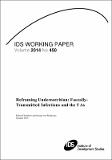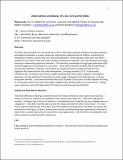The Sanitation Learning Hub: Recent submissions
Now showing items 101-120 of 133
-
Equality and Non-Discrimination (EQND) in Sanitation Programmes at Scale (Part 1 of 2)
(Institute of Development Studies, 2017-08)A well-facilitated Community-Led Total Sanitation (CLTS) programme that pro-actively considers and involves people who might be disadvantaged has been shown to have many benefits. A lack of this can and will often have ... -
Supporting the Least Able Throughout and Beyond CLTS
(Institute of Development Studies, 2017-06)Since its conception in 1999, Community-Led Total Sanitation (CLTS) has spread to over 60 countries and resulted in millions of people across the world living in open defecation free (ODF) communities. The approach was ... -
Tracking Progress and Sustainability: Monitoring, Verification and Certification of CLTS
(Institute of Development Studies, 2017-01)Monitoring, verification and certification are essential for ensuring the success and sustainability of Community-Led Total Sanitation (CLTS) efforts. Monitoring assesses and documents progress towards and the sustainability ... -
Keeping Track: CLTS Monitoring, Certification and Verification
(Institute of Development Studies, 2017-01)Monitoring, verification and certification are critical elements of the CLTS process and contribute to ensuring sustainability of ODF as well as learning about changes that are needed to improve implementation. Monitoring ... -
The Addis Agreement: Using CLTS in peri-urban and urban areas
(Institute of Development Studies, 2016-08)The CLTS Knowledge Hub with the support of Plan International Ethiopia, convened a three day workshop focusing on ‘Using a CLTS Approach and Tools in Peri-Urban and Urban Environments’ in Addis Ababa in June 2016. Over ... -
The Community Incentive Model: Towards an Open Defecation Free Chhattisgarh
(2016-12)The Indian Governments Swachh Bharat Mission offers a 12,000 rupee incentive to Below Poverty Line and certain Above Poverty Line households without a toilet. However, translating the incentive into successful sanitation ... -
Sustainable Sanitation for All: Experiences, challenges and innovations
(Practical Action, 2016-06)Great strides have been made in improving sanitation in many developing countries. Yet, 2.4 billion people worldwide still lack access to adequate sanitation facilities and the poorest and most vulnerable members of society ... -
Using a CLTS Approach in Peri-Urban and Urban Environments: Potential at Scale
(Institute of Development Studies, 2016-07)This note summarises the potentials and limitations of using a CLTS approach in peri-urban and urban environments. It identifies the actions needed to take the approach to scale. It is one output from a workshop convened ... -
CLTS in Post-Emergency and Fragile States Settings
(Institute of Development Studies, 2016-07)This issue of Frontiers of CLTS explores the potential, and some of the recorded learning, on how CLTS, as a community-based, collaborative approach to sanitation behavioural change, can be applied successfully in contexts ... -
CLTS and the Right to Sanitation
(IDS, 2016-03)Lack of sanitation impacts on the rights to life and health, the right to education (through loss in school days, particularly for girls), and the right to dignity. The purpose of this issue of Frontiers of CLTS is to ... -
Norms, Knowledge and Usage
(IDS, 2016-01)The consistent usage of toilets has emerged as a major and growing problem, especially in India. Some members of a household with a toilet do not use it at all, while others use it only some of the time. This can start ... -
Breaking the Next Taboo: Menstrual Hygiene within CLTS
(IDS, 2015)Most adolescent girls and women menstruate. This means that for five to seven days each month they bleed through their vagina. This monthly bleeding is often accompanied by abdominal cramps, headaches, mood changes and ... -
Making Sanitation and Hygiene Safer: Reducing Vulnerabilities to Violence
(IDS, 2015-05)A lack of access to a basic toilet in or near the home, inappropriate design or siting of facilities, or poor access to water supply can lead to women and children defecating in the open during the hours of darkness ... -
Sustainability and CLTS: Taking Stock
(IDS, 2015-02)Each of three overlapping phases in the history of CLTS has presented its own major features, preoccupations and priorities: 1. Early growth and acceptance. Creativity, rapid learning, credibility. Refining methods, start-ups ... -
CLTS in Africa: Trajectories, challenges and moving to scale
(IWA Publishing, 2014)At AfricaSan 3 in Kigali it was clear that in short three years since the last AfricaSan conference, and in only five years since its initial rollout in Africa, Community-led Total Sanitation (CLTS) had spread and diversified ... -
Reframing Undernutrition: Faecally-Transmitted Infections and the 5 As
(Institute of Development Studies, 2014-10-30)The dominant nutrition discourse concerns access to adequate food and its quality. It now includes food security, food rights and justice, governance and agriculture. Despite many initiatives to assure food access, and ... -
Disability: Making CLTS Fully Inclusive
(IDS, 2014-07)CLTS aims at total sanitation. For that it has to be inclusive. There are ethical reasons for this, but the bottom line is that while any open defecation continues, all are affected. This issue of Frontiers of CLTS ... -
How to Trigger for Handwashing with Soap
(IDS, 2014-01-01)This is the second issue of Frontiers of CLTS: Innovation and Insights series. Community-Led Total Sanitation (CLTS) provides an excellent opportunity to facilitate handwashing behaviour change. The purpose of this document ... -
Participatory Design Development for Sanitation
(IDS, 2013-11-01)In this issue of the Frontiers of CLTS: Innovations and Insights series, Ben Cole, who helped UNICEF to adapt and trial participatory latrine design in Malawi, describes the different stages of participatory latrine design ... -
Undernutrition and Illbeing: 2Fs, 5As, CLTS and the MDGs
(2013-02-11)



















